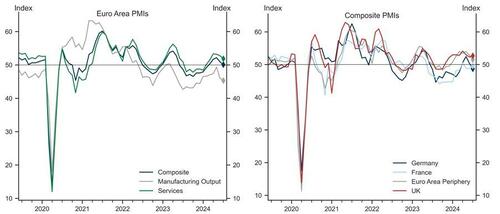US Services Soar, Manufacturing Slumps In Preliminary July PMIs
The Euro area composite flash PMI declined by 0.9pt to 50.1, notably below consensus. The deceleration in the composite index was broad-based across sectors, with the manufacturing output index falling to 45.3, and the services index declining to 51.9. Across countries, the decline in the area-wide index was driven by Germany and the periphery.
Source: Goldman Sachs
However, amid plummeting ‘hard’ data signals over the last two months, S&P Global’s ‘soft’ surveys have soared (somehow) in the US (even as European PMIs slipped lower), but were expected to dip a little in the flash July print.
But the picture – as always – was mixed with Manufacturing tumbling to 49.5 from 51.6 (51.6 exp) while Services accelerated further to 56 from 55.3 (54.9 exp)…
Source: Bloomberg
That dragged the Composite US PMI up to 55.0 – a 27-month high (as Europe hits 4-month lows)…
Source: Bloomberg
Commenting on the data, Chris Williamson, Chief Business Economist at S&P Global Market Intelligence said:
“The flash PMI data signal a ‘Goldilocks’ scenario at the start of the third quarter, with the economy growing at a robust pace while inflation moderates.
“Output across manufacturing and services is expanding at the strongest rate for over two years in July, the survey data indicative of GDP rising at an annualized rate of 2.5% after a 2.0% gain was signaled for the second quarter.
“The rate of increase of average prices charged for goods and services has meanwhile slowed further, dropping to a level consistent with the Fed’s 2% target.
However, Williamson warns that the good news is qualified, however, with both the growth and inflation pictures containing some worrying elements to monitor in the coming months.
“From the output perspective, growth has become worryingly skewed, with manufacturing slipping back into contraction as the service sector gains further strength. Some of the production decline was linked to staff shortages, so could prove temporary – something which is supported by the sector reporting improved confidence about future growth prospects. However, both manufacturers and service providers are reporting heightened uncertainty around the election, which is dampening investment and hiring.
“In terms of inflation, the July survey saw input costs rise at an increased rate, linked to rising raw material, shipping and labour costs. These higher costs could feed through to higher selling prices if sustained, or cause a squeeze on margins.”
Not exactly rate-cutting ‘bad’ news for the doves.
credittrader
Wed, 07/24/2024 – 09:54

